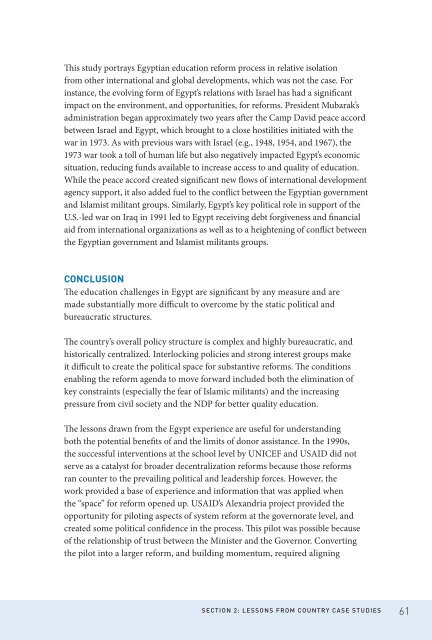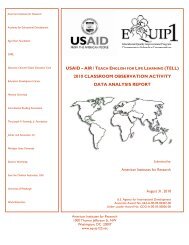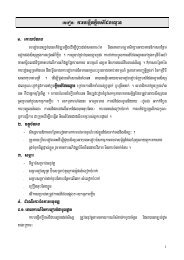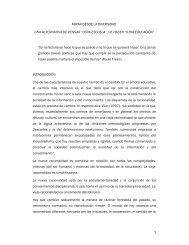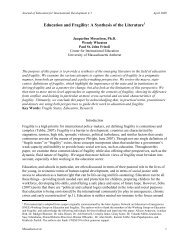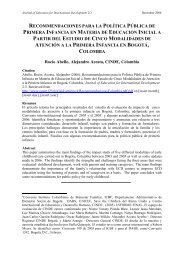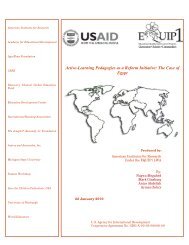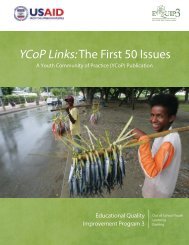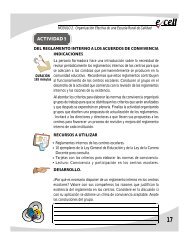The Power of Persistence: Education System ... - EQUIP123.net
The Power of Persistence: Education System ... - EQUIP123.net
The Power of Persistence: Education System ... - EQUIP123.net
Create successful ePaper yourself
Turn your PDF publications into a flip-book with our unique Google optimized e-Paper software.
This study portrays Egyptian education reform process in relative isolation<br />
from other international and global developments, which was not the case. For<br />
instance, the evolving form <strong>of</strong> Egypt’s relations with Israel has had a significant<br />
impact on the environment, and opportunities, for reforms. President Mubarak’s<br />
administration began approximately two years after the Camp David peace accord<br />
between Israel and Egypt, which brought to a close hostilities initiated with the<br />
war in 1973. As with previous wars with Israel (e.g., 1948, 1954, and 1967), the<br />
1973 war took a toll <strong>of</strong> human life but also negatively impacted Egypt’s economic<br />
situation, reducing funds available to increase access to and quality <strong>of</strong> education.<br />
While the peace accord created significant new flows <strong>of</strong> international development<br />
agency support, it also added fuel to the conflict between the Egyptian government<br />
and Islamist militant groups. Similarly, Egypt’s key political role in support <strong>of</strong> the<br />
U.S.-led war on Iraq in 1991 led to Egypt receiving debt forgiveness and financial<br />
aid from international organizations as well as to a heightening <strong>of</strong> conflict between<br />
the Egyptian government and Islamist militants groups.<br />
CONCLUSION<br />
<strong>The</strong> education challenges in Egypt are significant by any measure and are<br />
made substantially more difficult to overcome by the static political and<br />
bureaucratic structures.<br />
<strong>The</strong> country’s overall policy structure is complex and highly bureaucratic, and<br />
historically centralized. Interlocking policies and strong interest groups make<br />
it difficult to create the political space for substantive reforms. <strong>The</strong> conditions<br />
enabling the reform agenda to move forward included both the elimination <strong>of</strong><br />
key constraints (especially the fear <strong>of</strong> Islamic militants) and the increasing<br />
pressure from civil society and the NDP for better quality education.<br />
<strong>The</strong> lessons drawn from the Egypt experience are useful for understanding<br />
both the potential benefits <strong>of</strong> and the limits <strong>of</strong> donor assistance. In the 1990s,<br />
the successful interventions at the school level by UNICEF and USAID did not<br />
serve as a catalyst for broader decentralization reforms because those reforms<br />
ran counter to the prevailing political and leadership forces. However, the<br />
work provided a base <strong>of</strong> experience and information that was applied when<br />
the “space” for reform opened up. USAID’s Alexandria project provided the<br />
opportunity for piloting aspects <strong>of</strong> system reform at the governorate level, and<br />
created some political confidence in the process. This pilot was possible because<br />
<strong>of</strong> the relationship <strong>of</strong> trust between the Minister and the Governor. Converting<br />
the pilot into a larger reform, and building momentum, required aligning<br />
SECTION 2: lESSONS fROM COUNTRY CASE STUdIES<br />
61


